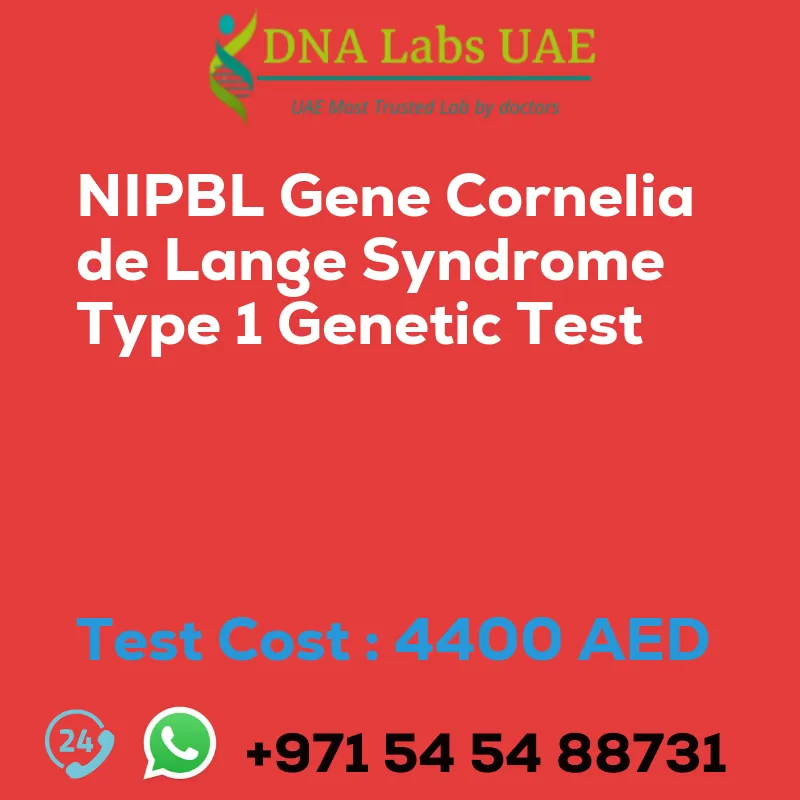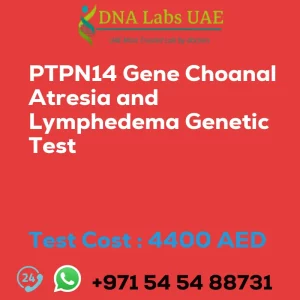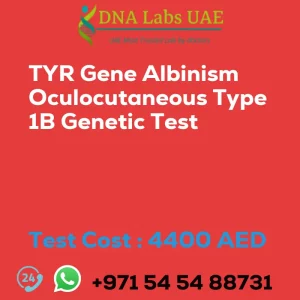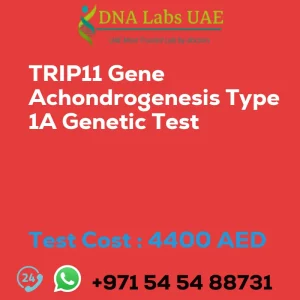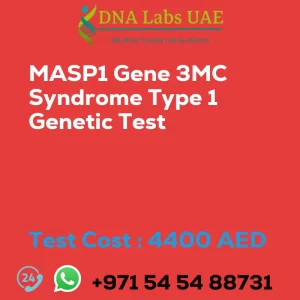NIPBL Gene Cornelia de Lange Syndrome Type 1 Genetic Test
Cost: AED 4400.0
Introduction
The NIPBL gene is responsible for producing a protein called Nipped-B-like protein, which plays a crucial role in the development and maintenance of various body structures. Mutations in the NIPBL gene can lead to a rare genetic disorder known as Cornelia de Lange syndrome type 1 (CdLS1).
About Cornelia de Lange Syndrome Type 1
Cornelia de Lange syndrome is a genetic disorder that affects multiple systems in the body, including growth, development, and cognitive function. CdLS1 is the most common type of CdLS and is caused by mutations in the NIPBL gene.
Test Details
The NIPBL Gene Cornelia de Lange syndrome type 1 Genetic Test is a Next-Generation Sequencing (NGS) genetic test. NGS technology allows for the simultaneous analysis of multiple genes. In the case of CdLS1, this test can identify mutations in the NIPBL gene that may be responsible for the condition.
Sample Condition and Report Delivery
The test requires a blood or extracted DNA sample, or one drop of blood on an FTA card. The report is typically delivered within 3 to 4 weeks.
Method and Test Type
The NIPBL Gene Cornelia de Lange syndrome type 1 Genetic Test utilizes NGS technology. It falls under the category of Osteology Dermatology Immunology Disorders. The test is conducted by dermatologists in the Genetics department.
Pre-Test Information
Prior to the test, it is important to provide the clinical history of the patient who is undergoing the NIPBL Gene Cornelia de Lange syndrome type 1 NGS Genetic DNA Test. A genetic counseling session is recommended to draw a pedigree chart of family members affected by CdLS1.
Benefits of the Test
The NIPBL Gene Cornelia de Lange syndrome type 1 Genetic Test can confirm a diagnosis of CdLS1 and provide information about the specific genetic mutation involved. It is helpful in guiding medical management and counseling for affected individuals and their families.
Ordering the Test
The test can be ordered by a healthcare provider or genetic counselor. It is usually recommended for individuals who exhibit symptoms consistent with CdLS1 or have a family history of the condition.
| Test Name | NIPBL Gene Cornelia de Lange syndrome type 1 Genetic Test |
|---|---|
| Components | |
| Price | 4400.0 AED |
| Sample Condition | Blood or Extracted DNA or One drop Blood on FTA Card |
| Report Delivery | 3 to 4 Weeks |
| Method | NGS Technology |
| Test type | Osteology Dermatology Immunology Disorders |
| Doctor | Dermatologist |
| Test Department: | Genetics |
| Pre Test Information | Clinical History of Patient who is going for NIPBL Gene Cornelia de Lange syndrome type 1 NGS Genetic DNA Test. A Genetic Counselling session to draw a pedigree chart of family members affected with NIPBL Gene Cornelia de Lange syndrome type 1 NGS Genetic DNA Test gene NIPBL |
| Test Details |
The NIPBL gene is responsible for producing a protein called Nipped-B-like protein, which is involved in the development and maintenance of various body structures. Mutations in the NIPBL gene can lead to a condition called Cornelia de Lange syndrome type 1 (CdLS1). Cornelia de Lange syndrome is a rare genetic disorder that affects multiple systems in the body, including growth, development, and cognitive function. CdLS1 is the most common type of CdLS and is caused by mutations in the NIPBL gene. NGS (Next-Generation Sequencing) genetic testing is a type of genetic test that can analyze multiple genes simultaneously. In the case of CdLS1, NGS genetic testing can identify mutations in the NIPBL gene that may be responsible for the condition. This test can help confirm a diagnosis of CdLS1 and provide information about the specific genetic mutation involved. NGS genetic testing is typically performed using a blood or saliva sample. The sample is sent to a laboratory where the DNA is extracted and sequenced. The data obtained from the sequencing is then analyzed to identify any mutations or variations in the NIPBL gene. Genetic testing for CdLS1 can be helpful in confirming a diagnosis, providing information about the specific genetic mutation, and guiding medical management and counseling for affected individuals and their families. It is usually recommended for individuals who exhibit symptoms consistent with CdLS1 or have a family history of the condition. The test can be ordered by a healthcare provider or genetic counselor. |

